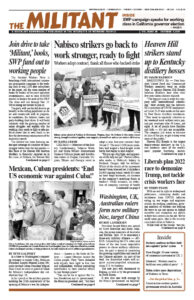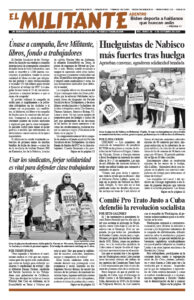President Joseph Biden was joined by Scott Morrison and Boris Johnson, the prime ministers of Australia and Britain, Sept. 15 to announce a three-way military alliance — AUKUS. Committing the U.S. rulers and those of the two lesser imperialist powers to closer military collaboration, the pact is aimed at countering the growing capabilities and reach of the Chinese military. As part of the deal, the Australian rulers will acquire nuclear-propelled submarines using U.S. technology.
The new pact was denounced by Beijing, as well as by the government in North Korea.
It was also met with outrage by the French government, an imperialist ally sidelined by the pact. Some capitalist governments in East Asia, including in Japan, Taiwan and the Philippines, backed the pact, hoping to see the growth of Beijing’s power in the region checked.
The submarines will be armed with Tomahawk missiles, not nuclear weapons. This is only the second time Washington has agreed to share its nuclear submarine technology, after its 1958 agreement with London.
Powered by nuclear reactors, these submarines are stealthier, faster and have far greater range and endurance than conventionally powered vessels. Only six major powers, all nuclear armed, currently have such warships. The opposition Labor Party in Australia backed the deal, after receiving assurance Canberra will not get nuclear weapons, as well as confirming the eight warships will be built in Australia.
“Military pacts signed by the U.S. government, like its entire foreign policy, are designed to defend the interests of the ruling capitalist families and their drive for domination and profits worldwide,” Joanne Kuniansky, Socialist Workers Party candidate for New Jersey governor, told the Militant. “These are the same bosses who are attacking workers’ wages, conditions and unions at home.
“Workers need our own foreign policy starting from solidarity with fellow working people, including in China and across Asia,” Kuniansky said.
Biden’s foreign policy, like Donald Trump’s before him, is focused on the U.S. rulers’ rivalry with Beijing. Washington’s moves come from weakness, not strength. The global world order put together by the U.S. rulers after they emerged victorious over enemies and allies alike from the second imperialist world war is being pulled apart as a result of intensifying competition with its rivals and the rise of Beijing.
Following the collapse of the Stalinist regimes in the Soviet Union and Eastern Europe, the U.S. rulers have acted on the illusion that they won the Cold War and could impose their authority at will. This pact reflects the fact this assumption was false.
As recently as three years ago, Australian Prime Minister Morrison declared that his government “doesn’t have to choose” between Washington, the Australian rulers’ long-standing military ally, and friendly relations with their biggest trading partner, Beijing. That has changed.
Now, Morrison said, the Australian rulers must face the “global contest of our age.” The new submarines plus cruise missiles will enable Canberra to project military power across the Indo-Pacific as an integral part of U.S.-led forces. The deal increases the long-term presence of U.S. Marines, warships and aircraft at Australian bases, as well as technological collaboration on cyberwarfare and high-tech weaponry.
British nuclear submarines may also use Australian bases in the future to increase their presence in the Indo-Pacific. London’s participation in the pact reflects its shift to deepen an alliance with Washington and with Canberra after its departure from the European Union.
Deal sidelines Paris, Europe powers
French Foreign Minister Jean-Yves Le Drian called the decision to form the pact “a knife in the back.” A 2016 contract worth tens of billions of dollars between Canberra and Naval Group, a Paris-based firm, to build 12 French-designed diesel-electric submarines, was made null and void when the decision to found AUKUS was announced. It came after six months of secret negotiations that excluded Paris.
Claiming his government was blindsided, Le Drian likened Biden’s decision to the treatment of U.S. allies under former President Donald Trump. In protest, the French government recalled its ambassadors to the U.S. and Australia Sept. 17. Paris says it will try to delay trade negotiations due between EU officials and the Australian government.
All three governments that signed the pact argued they still consider their alliance with the French rulers important. Paris is the main military power in the European Union and still has colonies in the Pacific, from New Caledonia to French Polynesia.
Even though weakened, the U.S. rulers still rule the roost of the imperialist pecking order.
Le Drian claimed the course of the AUKUS powers was “militarily confrontational.” Like other ruling classes in Europe, Paris is lured by profiting from huge markets in China and capital investment from Chinese companies, so it tries to minimize conflicts with Beijing.
A senior EU official told the Sept. 16 Financial Times that the announcement of the AUKUS pact was an example of how “Europe might be rich but isn’t powerful.” The rival ruling classes in Europe lack the military clout to defend their interests amid rising worldwide competition.
Arms race in Pacific
Chinese foreign ministry spokesman Zhao Lijian accused the AUKUS governments of “intensifying the arms race.” Chinese state media warned that Australia was now an “adversary” of the Chinese rulers and threatened that it should “prepare for the worst.”
The Australian capitalist rulers benefited greatly from massive industrialization in China on the backs of working people over the past several decades. From 2000 to 2015, Australian exports to China increased twentyfold.
But relations deteriorated after successive Australian governments placed curbs on Chinese firms’ efforts to take over Australian infrastructure, telecommunications and land-owning companies. Beijing complains the Australian government interferes with its policies in Hong Kong. The Chinese government has imposed trade sanctions on Australian coal, beef, barley, lobsters and wine.
Beijing has been steadily expanding its military reach for years. The Chinese navy has a larger number of smaller warships, but the U.S. Navy remains dominant worldwide. The Chinese rulers are building their third aircraft carrier, still a long way from the 11 in U.S. fleets. Chinese navy vessels are making ever-closer forays to Guam, where Washington bases its submarine fleet in the region.
Along with AUKUS, Washington seeks to strengthen its QUAD alliance with the rulers of Japan, India and Australia. Biden is set to host those countries’ prime ministers at a Washington summit Sept. 24. The Times of India noted that “in the future” AUKUS and QUAD “could merge.”

